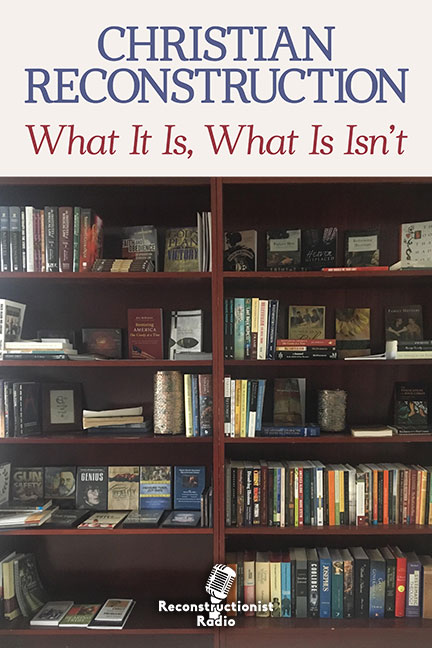
Part 2: Question 5: Are We Now Under the “Law of Christ” Rather Than the “Law of Moses”?
Gary North and Gary Demar
Narrated By: Daniel Banuelos & Devan Lindsey
Book: Christian Reconstruction: What It Is, What It Isn’t
Topics: Doctrinal Studies
Subscribe to the Audiobook
iTunes Google Spotify RSS FeedChapter Text
Aren’t We Now Under the “Law of Christ” Rather Than the “Law of Moses”?
Paul admonished the Corinthian church to depart from any doctrine that had the effect of dividing Christ (1 Corinthians 1:13). Many well-meaning Christians maintain false divisions regarding the law which have the effect of dividing the Triune God. They want to make a radical distinction between the “law of God” and the “law of Christ” as if there are two law systems operating in the Bible. Using this methodology, Jesus of the New Testament is opposed to Jehovah of the Old Testament. Jesus is a God of love, while Jehovah is a God of wrath. Jesus is a God of grace, while Jehovah is a God of law. These are false distinctions.
In a similar way, the “law of Christ” is inappropriately pitted against both the “law of Moses” and the “law of God” as if there are three separate law systems, each in opposition to one another. Here’s just one example of the way the “law of Christ” is made a separate body of laws superceding the “law of God.”
Currently, God has made a new covenant with his people – the church – and we live under the “law of Christ” (Galatians 6:2).[1]
What do these authors mean? Are we to assume that the “law of Christ” nullifies the “law of Moses” and the “law of God”? What is the “law of Christ”? The authors tell us that the “law of Christ is known by other names in other contexts: the perfect law, the law of liberty Games 1:25), the royal law Games 2:8), and the law of love (Romans 13:8-10).”[2] But can’t these designations also be expressions for “God’s law” in general? Why are they synonyms for the “law of Christ” but not for God’s law, which would include the law of Christ since Jesus is God?
The Bible does not tell us that these are synonyms exclusively reserved for the “law of Christ.” The Psalmist informs us that “the law of the LORD is perfect, restoring the soul” (Psalm 19:7). The law of Christ is also described as “perfect” Games 1:25). What law is then perfect: Both the “law of God” and the “law of Christ,” because they are one and the same! “The Law of Moses is none other than the Law of Christ.”[3] Remember, Moses is the agent of the law, not the author. “The law was given by him, or through him; the giver is God. Hence, before we begin to think poorly of Moses for the troubles he caused in giving Israel the law, we need to back up and remark, ‘But the giver of Torah is God.’ Law is a gift.”[4]
House and Ice continue in vain to make a radical distinction between the “law of Christ” and the “law of Moses.”
Paul teaches that the essence of the law is “through love serve one another” ([Galatians] 5:13), and he echoes Christ’s teaching when he says, “the whole law is fulfilled in one word, in the statement, ‘You shall love your neighbor as yourself’ ” (5:14).[5]
But wait a minute! From what source does Jesus quote “You shall love your neighbor as yourself’? Let me quote it for you: “You shall not take vengeance, nor bear any grudge against the sons of your people, but you shall love your neighbor as yourself; I am the LORD” (Leviticus 19:18). Paul quotes Jesus. Jesus quotes the Mosaic law! The law, even the Mosaic law, tells us how “through love” we ought to “serve one another.
[1] H. Wayne House and Thomas D. Ice, Dominion Theology: Blessing or Curse? (Portland, OR: Multnomah Press, 1988), p. 262.
[2] Ibid., p. 179.
[3] Ernest Kevan, The Moral Law (Jenkintown, PA: Sovereign Grace Publishers, 1963), p.1.
[4] Ronald B. Allen, “In His Law, the Surprise of His Grace,” Moody Monthly (December 1989), p. 44.
[5] House and Ice, Dominion Theology, p. 179.
